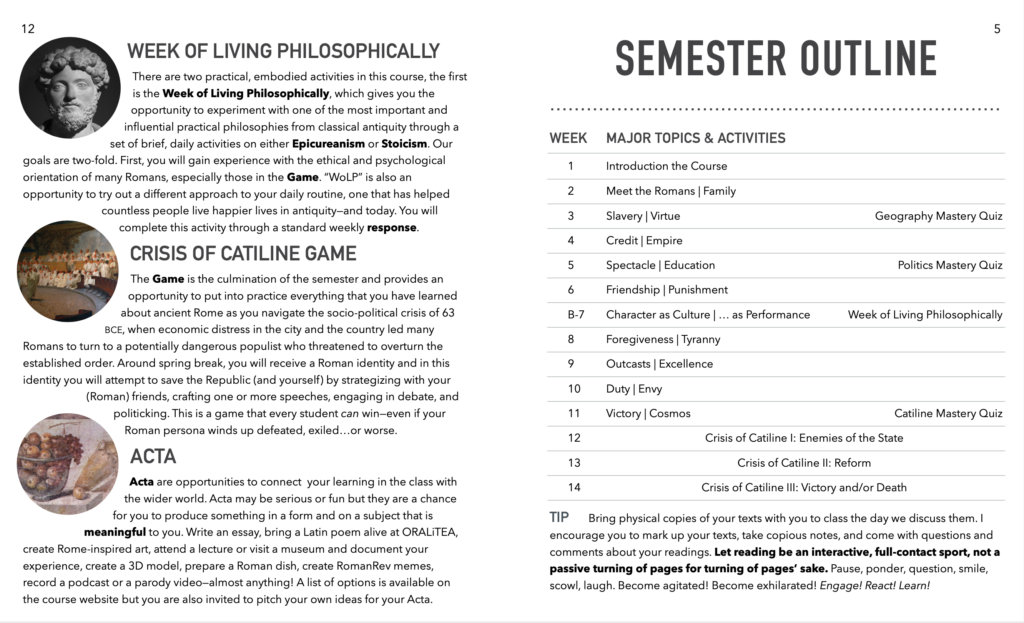Course Description
Link to full Course Description Booklet
Walk a mile in roman sandals
The object of this course is no less than you to learn what it is like to be an ancient Roman—and why that still matters in 21st century. To do so we will investigate what made the Romans revolutionary in their time and of lasting influence thereafter. This course is a rara avis (a rare bird). It is not only a history course—although we will encounter 1,000 years of Roman history, some of it in delicious detail. Still less is this only a literature course or an art history course—although we will be reading some of the greatest literature ever written and studying the sculptural and architectural monuments that gave shape to the European tradition, mediating the Greek achievement to what became known (for good and ill) as the West. Think of this instead as a moral orientation to the Romans and their republic. What do we mean by “moral” or “republic,” or for that matter “Roman”? Fourteen weeks from now you will know!
Basic approach
The course will comprise interactive lecture, discussion—both corporate and factional—and other activities. You will reactto the ideas and texts you encounter throughout the semester through your choice of reflective activities (e.g., short essays, quizzes, expressive projects). There will also be a visit to a (very) local museum, film viewings, and maybe a Roman feast (couch optional). The course culminates in a three-week role-playing game, in which you will assume a particular Roman persona and try to navigate a particular socio-political crisis when the fate of the Roman way of life hung in the balance. For the first eleven weeks of the semester you will train for your part by learning as much as you can about Roman history and culture from the 7th century BCE to the 4th century CE and by learning how a Roman, specifically your Roman-self, might think and talk about these events, texts, inventions, ideas, and other things. Also, complementary to the game, you can spend a week experiencing how Stoic and Epicurean ideas of wisdom, justice, courage, and moderation can affect your engagement with the world.
The essential goal of the class is to cultivate intellectual empathy, by that I mean the ability to situate yourself inside the mind of an author, character, person, or culture and see the world from those different perspectives—and to understand the challenges and limitations of this form of intellectual transformation.
Implicit in this exercise and especially in the game is a critique (note: not criticism) of modernity in its political, ethical, rhetorical, and—in the broadest sense—cultural forms. Thus by the summer, with any luck, you will have won some insight into what it is to be a 1st century bce Roman and with this knowledge have earned a better sense what it is to be a person living in the 21st century CE.
Outline & unique experiences

Preliminary goals
At the outset of the course, I offer these shared subsidiary goals:
- Describe ancient Rome’s cultural and political innovations, achievements, and failures and (some of) their influence on subsequent cultures.
- Understand the full chronological, geographic, and demographic diversity of those who comprised the “Romans”.
- Gain awareness of the many ways great and small that the Romans are still with us.
- Compare Roman society with that of contemporary America (and other other cultures) based on a general knowledge of the major historical events, individuals, and intellectual trends of Roman antiquity.
- Have improved your reasoning and writing skills, with the goal of communicating more effectively in speech and in prose.
The ultimate goal of this course—in design and intent—is to empower you to do what millions of people across time and space have done: to find personal meaning in (studying) the Romans.